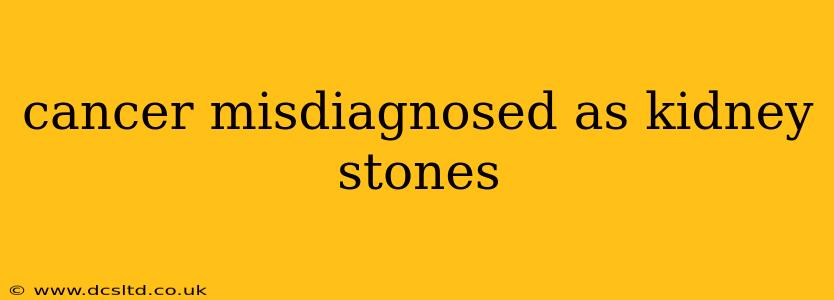Cancer misdiagnosis is a serious issue, and one particularly concerning scenario is when cancer symptoms are mistaken for kidney stones. This delay in diagnosis can significantly impact treatment outcomes and prognosis. This article will explore the reasons behind this misdiagnosis, the symptoms that can be easily confused, and the crucial steps to take to ensure accurate diagnosis and timely treatment.
What are the Symptoms that Can Be Confused?
Many symptoms of early-stage kidney cancer mimic those of kidney stones, leading to potential misdiagnosis. Both conditions can cause:
- Flank Pain: This sharp, intense pain in the side and back is a common symptom for both kidney stones and kidney cancer. The location of the pain might be similar, making differentiation difficult based on pain alone.
- Hematuria (Blood in the Urine): While more common with kidney stones, blood in the urine can also be a sign of kidney cancer. The amount of blood present and the persistence of the symptom can vary.
- Changes in Urination: Frequency, urgency, or burning during urination can occur with both conditions, although the underlying cause differs drastically.
How Can Kidney Cancer Be Mistaken for Kidney Stones?
The overlap in symptoms makes distinguishing between kidney stones and kidney cancer challenging, especially in the initial stages. Doctors often rely on initial patient history and readily available tests like urinalysis. A urinalysis might show blood or infection, which is consistent with both conditions. Imaging tests like X-rays can detect kidney stones, but might not always reveal small kidney tumors.
The tendency to initially diagnose and treat the more common condition (kidney stones) can lead to delays in detecting and addressing the potentially life-threatening kidney cancer. This is particularly true if the patient experiences relief from pain after initial treatment for kidney stones, potentially masking the underlying cancer.
What are the Key Differences to Look For?
While symptoms may overlap, there are some subtle distinctions that can help differentiate between kidney stones and kidney cancer:
- Persistence of Symptoms: Kidney stone pain usually comes and goes, often resolving after the stone passes. Kidney cancer pain tends to be more persistent and may worsen gradually.
- Fever and Chills: While a kidney infection accompanying a kidney stone can cause fever and chills, these are less common with kidney cancer alone.
- Weight Loss and Fatigue: Unexplained weight loss and persistent fatigue are more suggestive of cancer than kidney stones.
- A palpable mass: In some cases, a kidney tumor might be large enough to be felt as a mass in the abdomen.
What Tests are Used to Diagnose Kidney Cancer?
Accurate diagnosis is paramount. Further investigations beyond initial urinalysis and X-rays are crucial, including:
- CT Scan: A computed tomography (CT) scan provides detailed images of the kidneys and surrounding structures, allowing for better visualization of tumors.
- MRI Scan: Magnetic resonance imaging (MRI) offers another high-resolution view of the kidneys, particularly useful in assessing tumor size and location.
- Ultrasound: Ultrasound can be used to examine the kidneys and detect abnormalities.
- Biopsy: A biopsy involves removing a small tissue sample from the kidney to examine under a microscope, confirming a diagnosis of cancer.
What if I Suspect I Have Been Misdiagnosed?
If you have concerns about a potential misdiagnosis, seek a second opinion from a urologist or oncologist specializing in kidney cancer. Don't hesitate to advocate for yourself and request further testing if you experience persistent or worsening symptoms.
How Can I Reduce the Risk of Kidney Cancer?
While not all kidney cancers are preventable, reducing certain risk factors can help:
- Maintain a healthy weight: Obesity is linked to an increased risk of kidney cancer.
- Limit exposure to certain chemicals: Exposure to certain chemicals, such as asbestos and cadmium, increases the risk.
- Quit smoking: Smoking significantly increases the risk of many types of cancer, including kidney cancer.
This information is for educational purposes only and should not be considered medical advice. Always consult with a healthcare professional for any health concerns or before making any decisions related to your health or treatment. Early detection and prompt treatment are crucial for the best outcomes in kidney cancer.
